The 2023-24 season will mark 100 years for the Boston Bruins, and they have many big plans for their Centennial season. They recently released the “Historic 100”, a list honoring past and present Bruins’ greats, and they will host special “Era” nights against other Original Six franchises at TD Garden throughout the campaign. Over the weekend they held another special event as the Bruins unveiled three new jerseys for the Centennial season. The event also presented an opportune time for the franchise to announce who will be the 21st captain in franchise history but instead, fans will have to wait and see.
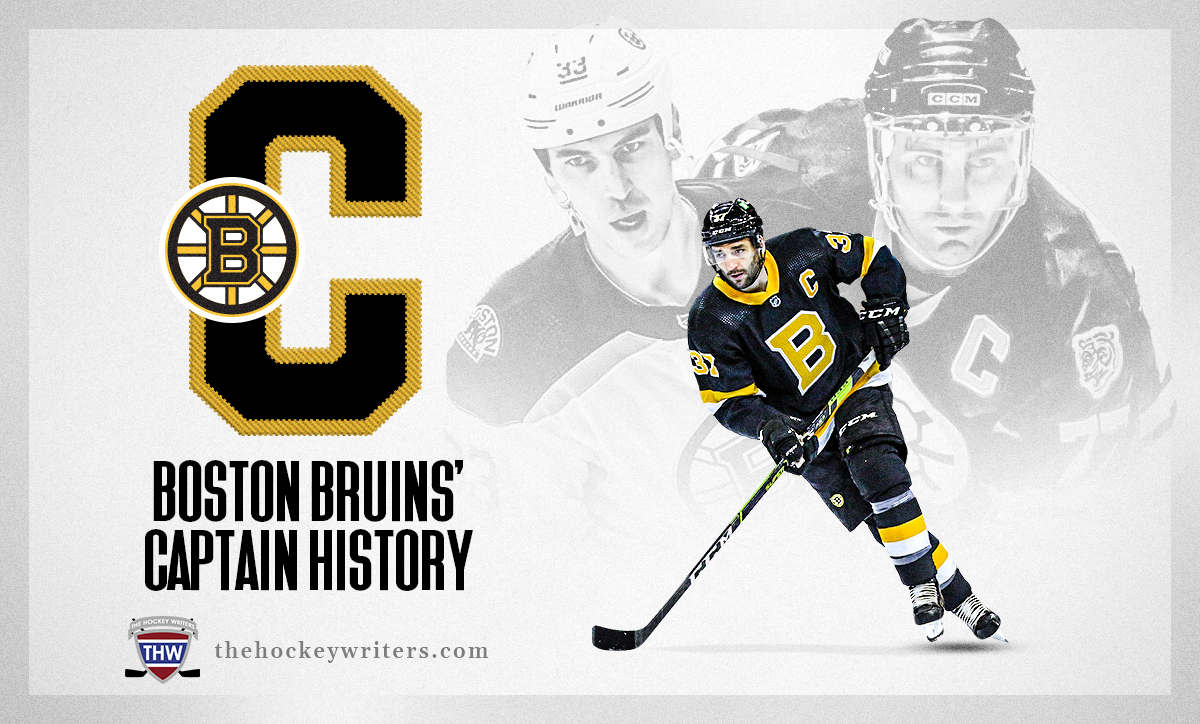
Although it has yet to be confirmed when they will make the announcement, head coach Jim Montgomery recently commented that the team will be naming a captain for the upcoming season. “I think we are trending in the right direction towards having someone be our captain [this season],” said Montgomery. “We’ve had internal conversations, and I think decisions will be made. I don’t know if there’s a timeline on that yet.” While the fanbase waits for the announcement and with it being the franchise’s Centennial season, what better time to ride down memory lane and look back at all of the past Bruins’ captains?
Sprague Cleghorn 1925-1927
Sprague Cleghorn was named the first captain in franchise history during the 1925-26 season. He was from Westmount, Quebec, and had played 14 pro seasons before joining the Bruins. He had won three Stanley Cup championships, two with the Ottawa Senators in 1920 and 1921 and one with the Montreal Canadiens in 1924.
Cleghorn spent the final three seasons of his career with the Bruins. He was one of the first offensive defensemen in NHL history and was known for being tough to play against. At the time of his retirement, his 169 career goals ranked second all-time by a defenseman. In his final season with Boston, he was appointed assistant coach while still playing defense for the club. The experienced defender also served as a great mentor for Eddie Shore during his time in Boston.
Lionel Hitchman 1927-1931
In an ironic twist, Lionel Hitchman took the reins from Cleghorn as the second captain in Bruins history. The irony lies in the fact that Cleghorn had once struck Hitchman with his stick and was charged with aggravated assault for the incident. All the violence aside, Hitchman captained the Bruins for four seasons, including in 1929, when they won their first-ever Stanley Cup championship.
Hitchman was included on the Bruins recently released “Historic 100”. He retired following the 1934-35 season, having played 378 games over ten seasons in Boston. He finished with 25 goals and 27 assists for 52 points during his time with the Bruins; however, he was better known for his defensive side of the game. Hitchman’s No. 3 hangs in the TD Garden’s rafters beside Shore’s No. 2 and Bobby Orr’s No. 4.
George Owen 1931-1932
Following Hitchman’s retirement, George Owen was named captain. His time as Bruins captain was only for the 1931-32 season. Owen, like the two captains prior, was another standout defenseman. He wore the No. 4 long before the world saw Orr make it his iconic jersey number.
Owen played five seasons for the Bruins before retiring as a professional hockey player. He had business ventures outside of hockey after having attended Harvard University. Following his time as a player, he remained involved with hockey, serving as a coach of the Milton Academy (USHS-Prep) from 1945 to 1965 before joining the Michigan Tech Huskies in 1973.
Dit Clapper 1932-1938, 1939-1947
Dit Clapper played his entire career with the Bruins and was part of three Stanley Cup-winning seasons in 1929, 1939, and 1941. In the early stages of his career, he played right wing on the “Dynamite Line” with Cooney Weiland and Dutch Gainor. The line was one of the first in NHL history to have a nickname, something that has become more popular over the years.
By the 1937-38 season, the Bruins’ defense corps needed an overhaul, so Art Ross asked him to move to his original defense position. While playing defense, Clapper was paired with Shore, and the pairing played a strong role in the Bruins’ Cup wins in 1939 over the Toronto Maple Leafs and in 1941 over the Detroit Red Wings. He also became the first player to be named an NHL All-Star at both the forward and defense positions. At the time of his retirement in 1947, he also became the first player to play 20 seasons in the NHL, amassing 229 goals and 248 assists for 477 points in 835 games. Following his retirement, the Bruins held a ceremony for Clapper, honoring his career and retiring his No. 5 jersey on Feb 12, 1947. He was inducted into the Hockey Hall of Fame in 1947 and was named to the “Historic 100” list of legendary Bruins.
Cooney Weiland 1938-1939
Cooney Weiland began his career with the Bruins in 1929, winning a Stanley Cup in his rookie year. As mentioned above, he was part of the “Dynamite Line” with Clapper. During the height of the line’s performance in 1929-30, Weiland led the NHL in goals (43) and points (73) in 44 games.
After four seasons with the Bruins, Weiland spent two seasons with Ottawa and two seasons with the Red Wings before returning to Boston for the 1935-36 campaign. He was named captain for his final NHL season in 1938-39, and the Bruins won their second Stanley Cup championship that year. Following his time as a player, Weiland stepped behind the bench and served as the Bruins’ coach for two seasons, helping them capture another championship in 1941. He went on to coach the Harvard University hockey club from 1950 to 1971 and was inducted into the Hockey Hall of Fame following his retirement.
John Crawford 1946-1950
John Crawford made his NHL debut in 1937-38, playing two games with the Bruins. The following season, the right-handed defenseman was part of the 1939 Stanley Cup. He played his entire NHL career with the Bruins from 1937 to 1950. He was twice named as a member of the NHL All-Star team in 1943 and 1946.
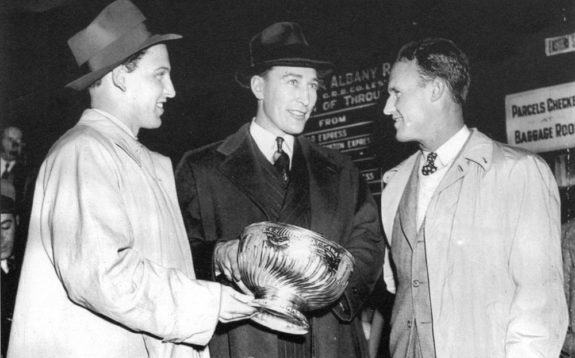
During the 1946-47 season, Crawford was named captain due to his dedication to the team and the standard he set for himself and his teammates. He was the Bruins’ captain for the final four years of his NHL career before playing two seasons with the Hershey Bears in the American Hockey League (AHL). Crawford took to coaching after his playing days and coached 659 games in the AHL between the Bears, Providence Reds, Rochester Americans, and Baltimore Clippers. In 1973, while being the general manager of the Cape Cod Cubs in the Eastern Hockey League (EHL), Crawford collapsed during one of the home games and sadly passed away two days later at the age of 56.
Milt Schmidt 1950-1955
Bruins legend Milt Schmidt, often referred to as “the ultimate Bruin,” succeeded Crawford as the next captain in franchise history. He played a large role in the 1939 and 1941 Stanley Cup wins while playing on the “Kraut Line” featuring Bobby Bauer and Woody Dumart, providing much of the offense needed to win. Schmidt spent his entire NHL career with the Bruins, playing 776 games over 16 seasons. He had 229 goals and 346 assists for 575 points and was honored for his accomplishments by being inducted into the Hall of Fame in 1961.
Related: Bruins’ Rivalries Revisited: Toronto Maple Leafs
Following the 1941 championship season, Schmidt and his linemates, Bauer and Dumart, enlisted in the Canadian military and served in World War II together. The Bruins arch-rivals, the Montreal Canadiens, famously carried the Kraut Line off the Boston Garden ice before their departures. The classy move left a lasting impression on Schmidt, who recalled the gesture and said, “Regardless of what happens on the ice, off the ice, we’re still friends.” Schmidt returned for the 1945-46 NHL season and played ten more seasons for the Bruins.
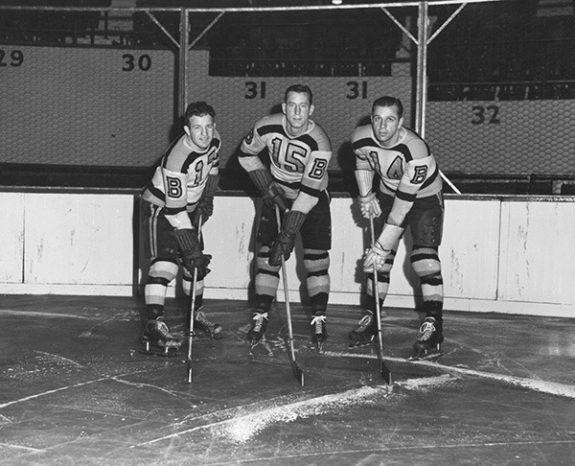
Named the Bruins’ captain during the 1950-51 season, Schmidt won the Hart Memorial Trophy as league MVP the same year. He held his position as captain until he retired as a player to take over as the club’s head coach in 1955, a title he held until 1966. After 11 years as the Bruins’ head coach, he was named the Bruins’ general manager and helped build the championship teams of the 1970s. His jersey No. 15 rightfully hangs from the rafters at TD Garden alongside many franchise greats.
Ed Sandford 1954-55
With Schmidt ending his playing career midseason to begin his coaching job, Ed Sandford took over as the next Bruins’ captain. He was a veteran left-wing already in his eighth season with the club. However, his time as captain was short-lived as he was included in a nine-player trade to the Red Wings prior to the 1956-57 season.
Sandford was an All-Star for five consecutive seasons from 1951 to 1955. He also led the playoffs in scoring with eight goals and three assists for 11 points in 11 games during the Bruins’ run to the 1953 Stanley Cup Final. Unfortunately, the Canadiens won the series in five games, and Sandford’s stellar play wasn’t enough to lead the club to another championship. He returned to Boston following his retirement and held many off-ice jobs with the organization, such as goal judge, official scorer, and supervisor of off-ice officials.
Fern Flaman 1955-1961
In 1955-56, following Sandford’s departure, the torch was passed along to a long-time Bruins’ defenseman, Fern Flaman. Signed by the Bruins as an 18-year-old, he earned a full-time spot on the blue line during the 1947-48 season. He was traded to the Maple Leafs in the midst of the 1950-51 campaign but returned to Boston three years later. In his first season back with the Bruins, he registered 150 penalty minutes (PIM). He wore the “C” on his jersey until he retired six seasons later. The physical defenseman played 14 seasons with the Bruins accumulating 1,004 PIM which currently ranks ninth in franchise history. Like many of the legendary Bruins on this list, Flaman was recently named as one of the Historic 100.
Don McKenney 1961-1963
Don McKenney was a Canadian forward signed by the Bruins as a teenager playing junior hockey with the Barrie Flyers. He made his debut with the Bruins in 1954-55 and put together an impressive rookie campaign, finishing second in Calder Memorial Trophy voting, handed out to the NHL’s top rookie annually. Known as a classy player with a clean playing style, McKenney was regularly a finalist for the Lady Byng Trophy. He won the award following the 1959-60 season.
After Flaman retired, McKenney was named the 11th captain in franchise history. He wouldn’t hold the title long as he was traded to the New York Rangers in the middle of his ninth season with the Bruins. Through his time with the Bruins, he scored 195 goals and 267 assists for 462 points in 592 games. McKenney passed away at the age of 88 in December 2022; his name was also recently added to the Bruins’ Historic 100.
Leo Boivin 1963-1966
After McKenney was traded to the Rangers, Leo Boivin took over the honor of being the Bruins captain. He was a 32-year-old veteran defenseman when he became captain during the 1963-64 season. The time period was a rough stretch for the Bruins as they missed the playoffs from 1960 to 1967. Boivin served as the anchor for a younger defense corps.
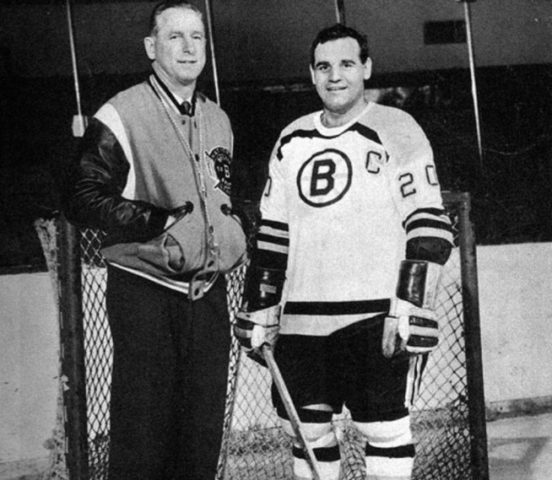
In February 1966, Boivin was traded to the Red Wings in a five-player trade. “I had been in Boston for a long time and they were struggling. (General manager) Hap Emms asked me if I would go to Detroit. It was near the (trade) deadline. (Doug) Barkley lost his eye that year and Sid Abel wanted me to go there. I said, ‘Sure, I’ll go to Detroit.’ It was quite a feeling to go in there because they had guys like (Gordie) Howe and (Alex) Delvecchio that I had hit hard through the years. But they welcomed me with open arms. I really enjoyed playing there.” He recalled of the trade. Boivin spent 12 seasons with the Bruins playing 717 games while scoring 47 goals and 164 assists for 211 points. Best known for his hard-hitting, defensive playing style, Boivin was inducted into the Hockey Hall of Fame in 1986.
Johnny Bucyk 1966-1967, 1973-1977
Johnny Bucyk, better known as “Chief” became the 12th captain in franchise history after Boivin was sent to the Red Wings. Originally signed by the Red Wings, the Bruins acquired Bucyk on June 15, 1957, in exchange for Terry Sawchuk, one of the greatest goaltenders of all time. The trade reunited Bucyk with Bronco Horvath and Vic Stasiuk, who played junior hockey together with the Edmonton Oil Kings of the Western Hockey League (WHL). The line became nicknamed the “UKE line” for the Ukrainian descent and the trio helped lead the Bruins to the 1958 Stanley Cup Final against the Canadiens.
Related: Bruins’ Rivalries Revisited: Detroit Red Wings
At the age of 31, and already in his tenth season with Bruins, Bucyk was appointed captain for the 1966-67 season. However, the Bruins decided to remove the “C” from Chief and had three alternate captains from 1967 to 1973. Don’t let that fool you though, Bucyk was still the Bruins’ unofficial captain, only with an “A” on his jersey instead. He received the Stanley Cup as any captain would when the Bruins won in 1970 and in 1972. “Skating with the Cup was a big thrill,” Bucyk said when asked what it meant to him. “I did it then (1970) and I did it in New York and I think it was the last time the individual captain would take the Cup and skate around with it. Now they do it as a group. I was honored and very happy to do that.”
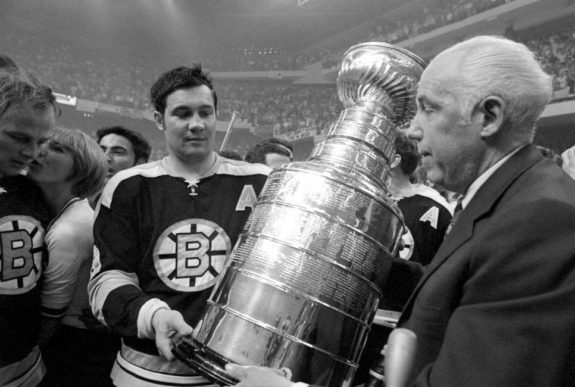
Bucyk was officially renamed captain in 1973, a title he kept until the 1976-77 season. After 21 seasons with the Bruins, his name was atop nearly all franchise marks at the time of his retirement. In total, he had 1,339 points with 545 goals and 794 assists in 1,436 games. All these years later, he still ranks first in goals and second in games played, assists, and points throughout franchise history. He had his No. 9 retired by the Bruins in 1980 and was inducted into the Hall of Fame in 1981. In 2017, he was named one of the 100 Greatest NHL Players, and at 88 years old still remains associated with the Bruins organization in one way or another.
Wayne Cashman 1977-1983
With Bucyk playing his final season in a lesser role, the torch was handed to Wayne Cashman, another forward, who made his debut with the Bruins in 1964-65 appearing in one game as a 19-year-old. Cashman became a regular with the club in 1968-69 and found chemistry on a line with Phil Esposito and Ken Hodge. Esposito credited Cashman as being the heart and soul of their high-scoring line. “Wayne was the digger. He was the heart and soul of our line. Without a doubt,” Esposito said in 2016 as Cashman was honored at the Sports Museum’s Annual Tradition held at TD Garden.
Related: Diving Deep: Boston Bruins’ All-Time Dynamic Duos
Cashman was a part of the championship teams in the 1970s and had four straight seasons, from 1970 to 1974, with 20 or more goals and over 100 penalty minutes. By 1977-78 he had gained a reputation of being one of the baddest “Big, Bad, Bruins.” However, as Dallas Smith promptly retired while he was temporarily wearing the “C” with Bucyk injured, Cashman took over as captain and began playing more disciplined hockey. Upon Bucyk’s return to the lineup, he insisted that Cashman wear the “C” permanently. He became a great leader for the “Lunchpail AC” era Bruins, something general manager Harry Sinden never envisioned. “I don’t think I ever could have dreamed of Cashman becoming such a leader,” Sinden said.
From that point on until his retirement following the 1982-83 season, Cashman remained the leader for the hard-nosed Bruins. He played his entire career in Boston finishing with 277 goals and 516 assists for 793 points in 1,027 games. Although he was recently named to the Historic 100, it is surprising that his No. 12 hasn’t been retired by the club.
Terry O’Reilly 1983-1985
The “Tasmanian Devil”, Terry O’Reilly, was a huge fan favorite in Boston. Similar to his predecessor Cashman, O’Reilly was tough and the perfect representation of the Big Bad Bruins. Drafted 14th overall in the first round of the 1971 NHL Draft, O’Reilly didn’t take long to make his debut with the Bruins. He broke in as a rookie during the 1971-72 season and right away made it clear he wasn’t one to back down from a fight, piling up 109 PIM. In 1977-78, he had a career year garnering Hart Trophy consideration (finished 8th in voting) while scoring 29 goals and 71 assists for 90 points. It’s hard to believe he had time for all that offense considering he also had 211 PIM that season.
After Cashman’s retirement it was fitting for O’Reilly to be named the next captain of the Bruins, as he had for so many years demonstrated leadership while protecting his teammates and putting his own body on the line for the greater good of the team. O’Reilly remained captain for the 1983-84 and 1984-85 seasons before retiring at the age of 33. He showed a perfect balance of grit and scoring touch over his career and at one point had five consecutive seasons with over 200 PIM. His career total of 2,095 PIM remains a franchise record. Through 14 seasons with the Bruins, he scored 204 goals and 402 assists for 606 points. His jersey No. 24 was retired in 2002 and hangs next to Ray Bourque’s No. 77 “protecting him once again.”
Rick Middleton 1985-1988
On May 26, 1976, the Bruins made a trade with the Rangers that stands as one of the best trades in franchise history. The Bruins sent an aging Hodge to the Blueshirts in exchange for a right-winger ten years younger, Rick Middleton. While Hodge retired after just one season with the Rangers, Middleton became one of the greatest scorers in Bruins’ franchise history. In his first game with Boston, “Nifty” scored a hat trick against the Minnesota North Stars. He became the Bruins’ best goal scorer in the 1980s, hitting the 40-goal mark in five consecutive seasons from 1979-80 to 1983-84.
With O’Reilly hanging up the skates and becoming the head coach of the Bruins, the club opted to go with co-captains splitting the honors between Middleton and Bourque. Middleton wore the “C” at home games while Bourque wore it on the road. The two Bruins’ legends continued to split captain duties until Middleton retired following the 1987-88 season. He retired with 898 points in 881 games through 12 seasons with the Bruins. His 402 goals rank fourth all-time in franchise history and on Nov. 18, 2018, they honored Middleton by retiring his No. 16.
Ray Bourque 1985-2000
Without knowing it at the time, the Bruins drafted one of the greatest defensemen in NHL history when they selected Ray Bourque eighth overall at the 1979 NHL Entry Draft. He wasted no time in making himself a household name for the Bruins, picking up 65 points with 17 goals and 48 assists during his rookie season. His solid performance earned him the Calder Trophy, becoming the first Bruins to win the award since Derek Sanderson in 1967-68.
Bourque continued to impress with his offensive prowess posting a career-high 96 points in the 1983-84 season. The Bruins’ star also became a young leader for the club leading to him being named co-captain with Middleton following O’Reilly’s retirement. After Middleton retired, Bourque took the reins as captain and went on to hold that title for a franchise record 15 seasons. Under his leadership, the Bruins made two Stanley Cup Final appearances but were ultimately unable to restore the glory the franchise had seen in the early 1970s. His tenure as the Bruins’ captain stood as the longest-serving team captain in NHL history until Steve Yzerman later broke the record with the Red Wings.
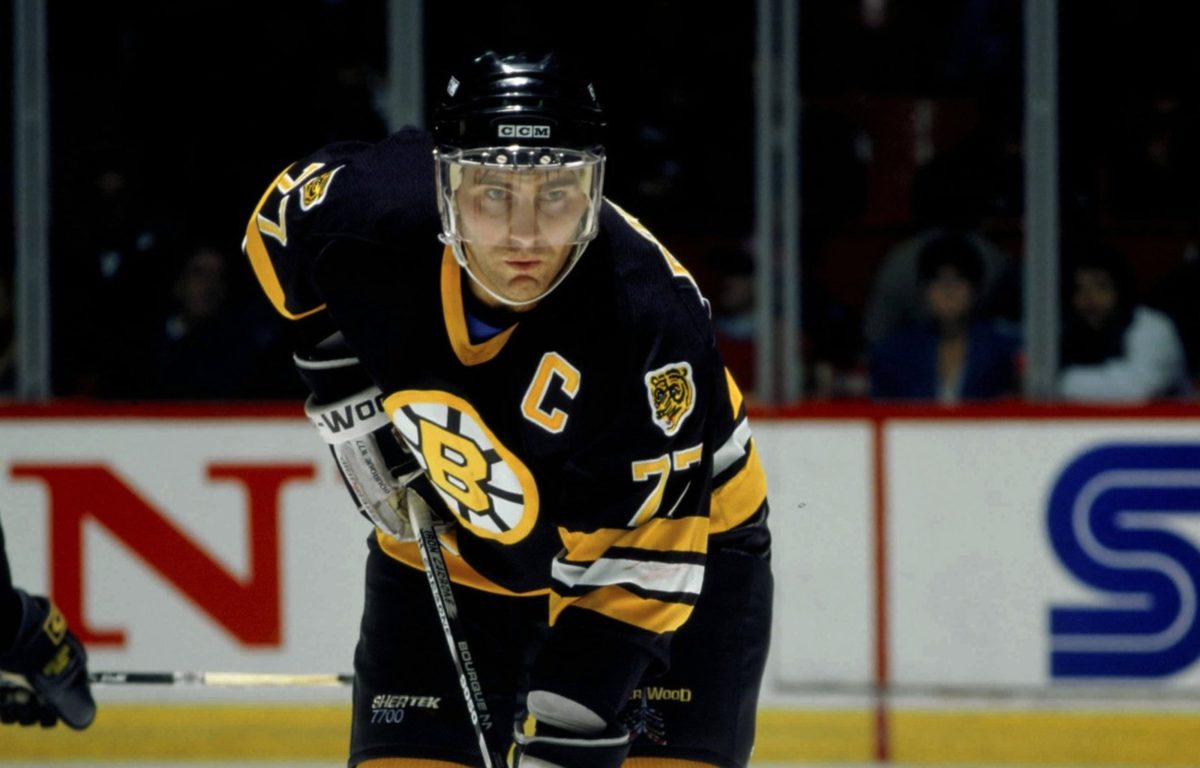
Throughout his time with the Bruins, Bourque piled up the career accomplishments, such as winning the Norris Trophy five times and being an NHL All-Star 17 consecutive seasons from 1979-80 to 1995-96. He played 21 seasons in Boston racking up a franchise-best 1,506 points in 1,518 games. His 1,111 assists also rank first in franchise history.
With Bourque nearing the end of his career and still chasing his dream of winning the Stanley Cup, the struggling Bruins traded him to the powerhouse Colorado Avalanche to make his dream a reality. In 2001, the Avalanche won with captain Joe Sakic iconicly handing Bourque the Cup.
Jason Allison 2000-2001
Acquired in a blockbuster trade that sent Adam Oates, Rick Tocchet and Bill Ranford to the Washington Capitals, Jason Allison became a star forward during his time with the Bruins (from ‘Oates, Carey Biggest Names in Big Deal’, LA Times, March 2, 1997). Allison was 21 years old at the time of the trade and had limited experience in the NHL. He enjoyed a breakout campaign during his first full season with the Bruins in 1997-98 scoring 33 goals and 50 assists for 83 points.
Allison found great chemistry playing alongside Bruins’ rookie Sergei Samsonov and Dmitri Khristich, as the trio formed one of the most dangerous lines in the NHL. While continuing to be an offensive sparkplug for the club, he was named captain following Bourque’s trade to the Avalanche. Due to issues surrounding his contract negotiations, the Bruins traded Allison to the Los Angeles Kings prior to the 2001-02 season, making his tenure as Bruins’ captain very short-lived.
Joe Thornton 2002-2006
After Allison was traded, the Bruins decided to go without a captain for the 2001-02 season. In October 2002, they named budding superstar Joe Thornton as the new captain. “I was very excited and very honored when Robbie told me,” Thornton said. “You see the guys that have been captain of this team and it’s a little mind-boggling that I’m going to be one of them. It’s a huge honor for me.
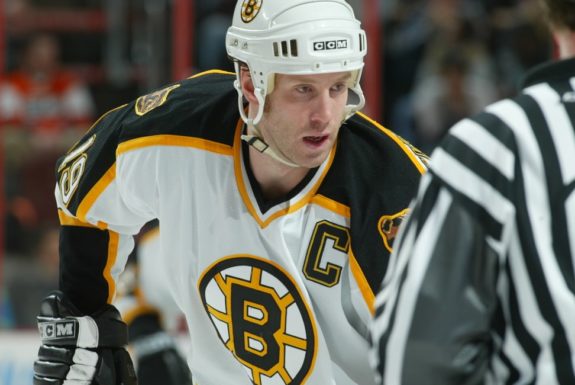
Thornton was the first overall selection in the 1997 NHL Entry Draft, and although it took him some time to adapt to the level of play in the NHL, he lived up to his immense expectations by finding his game in his third NHL season. He scored a career-high 37 goals in the 2000-01 season and became the new face of the franchise. After being named captain, he led the Bruins with 36 goals and 65 assists to eclipse the 100-point mark for the first time. His impressive season saw him finish fourth in voting for the Hart Trophy.
While his game continued to progress, Thornton became one of the best playmakers in the NHL. However, despite leading the Bruins to regular season success, he was unable to lead the club on any lengthy playoff runs. On Nov. 30, 2005, the Bruins shocked the hockey world by trading their captain to the San Jose Sharks. He was in the midst of his best season and continued to excel with the Sharks, winning the Hart Trophy as league MVP and the Art Ross Trophy as the scoring leader with 125 points.
Related: The Joe Thornton Trade: 10 Years Later
In eight seasons with the Bruins, he scored 169 goals and 285 assists for 454 points in 532 games. After playing a total of 24 NHL seasons, Thornton has yet to officially announce his retirement despite not playing during the 2022-23 campaign. His 1,539 points rank 12th while his 1,714 games played rank sixth all-time in NHL history.
Zdeno Chara 2006-2020
The Bruins didn’t name a replacement immediately after the Thornton trade, instead, they finished the campaign without a captain. However, in the summer of 2006, they made huge splashes in the free agent market by signing Zdeno Chara and Marc Savard to hefty contracts. The offseason moves dramatically changed their outlook for years to come and Chara was named the 19th captain in franchise history prior to the 2006-07 season.
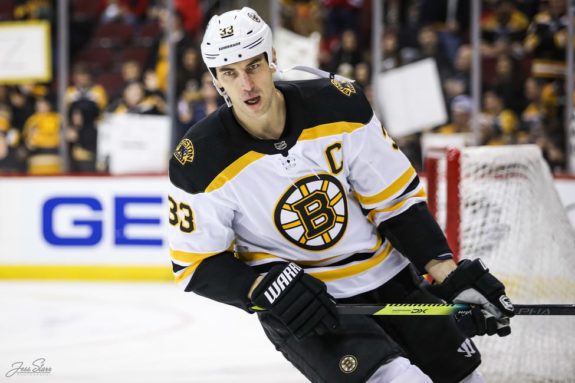
Chara was a pivotal factor in helping the Bruins win their sixth Stanley Cup championship in 2011. They remained a contender nearly every season with a core led by Chara and the likes of Bergeron, David Krejci, and Brad Marchand. He wore the “C” until his departure from the Bruins following the 2019-20 season.
Through 14 seasons in Boston, Chara scored 148 goals and 333 assists for 481 points in 1,023 games. He won the Norris Trophy in the 2008-09 season and was awarded the Mark Messier Leadership Award in 2010-11. After playing two more NHL seasons with the Capitals and the New York Islanders, he signed a one-day contract to rightfully retire as a Bruin. His No. 33 will no doubt be retired by the Bruins in the future and he will one day be inducted into the Hockey Hall of Fame.
Patrice Bergeron 2020-2023
Drafted by the Bruins in the second round, 45th overall at the 2003 NHL Entry Draft, Bergeron made the jump to the NHL at the age of 18. After a solid rookie performance with 16 goals and 23 assists in 71 games, he finished eighth in Calder Trophy voting. Due to the NHL Lockout in 2004-05, he continued his development in the AHL during his sophomore season. When he made his return to Boston following the lockout, his game improved by leaps and bounds posting 31 goals and 42 assists for 73 points in 81 games.
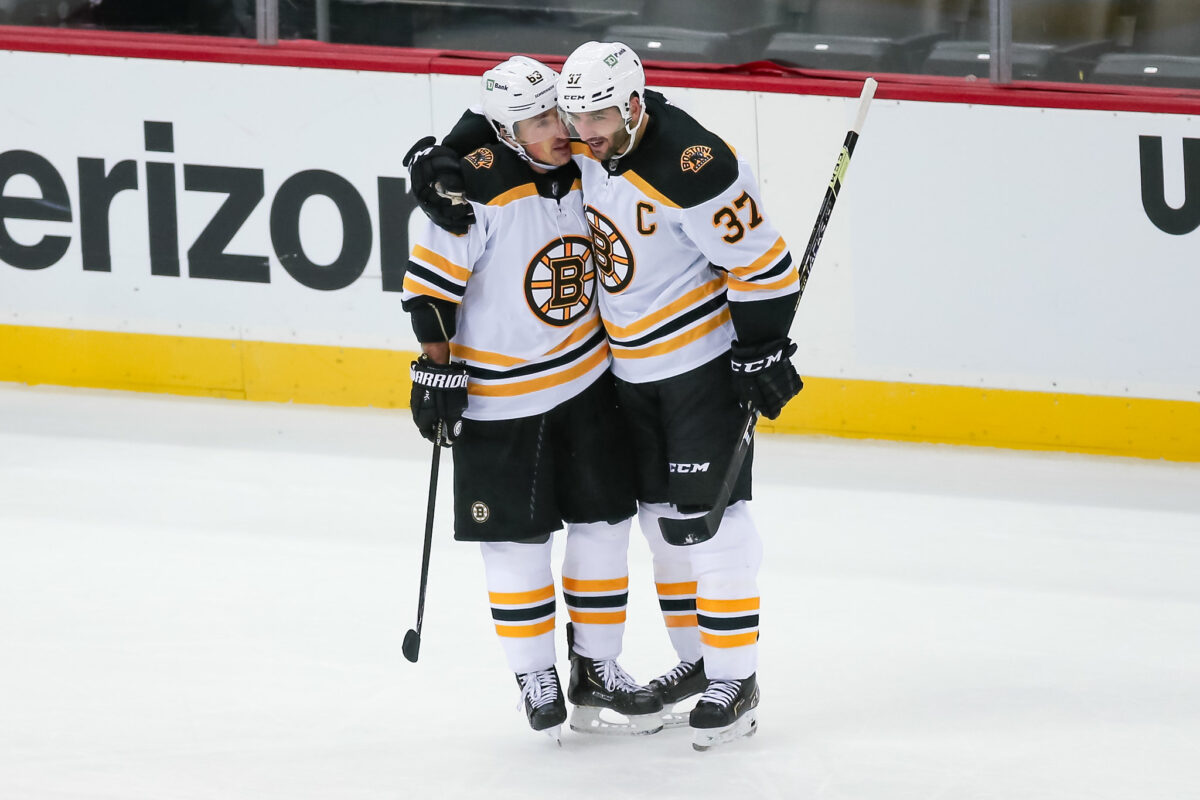
After a concussion nearly ended his career and limited him to ten games during the 2007-08 season, Bergeron came back the following season as the Bruins were just beginning to turn the corner and become a true contender once again. As each year passed it seemed that Bergeron continued to improve, and with defensive specialist Claude Julien coaching the Bruins, he became the best two-way player in the NHL. By 2011, during the Bruins championship run, Bergeron had become a vital piece of the puzzle and helped lead the team to their first Stanley Cup since 1972. He scored two goals including what would eventually be the Stanley Cup winning goal in Game 7 against the Vancouver Canucks.
Related: Patrice Bergeron’s Journey From Sitting in the Net to “Mr.Selke”
The Bruins returned to the Stanley Cup Final in 2013 and Bergeron was an absolute warrior playing in Game 6 with cracked ribs, torn cartilage, a punctured lung, and a separated shoulder. Time and time again Bergeron earned the respect of anyone who crossed his path, the fanbase, teammates, and even his opponents. He had a knack for coming up big during the big moments such as scoring the game-tying and overtime winner in the amazing Game 7 comeback against the Maple Leafs in 2013. Throughout his many years with the Bruins, he became a great leader well before he ever wore the “C” on his jersey.
After the Bruins decided not to re-sign an aging Chara, Bergeron was officially named captain ahead of the 2020-21 season and won the Mark Messier Leadership Award at the end of the campaign. The Bruins remained contenders with Bergeron leading the way however, they weren’t able to turn their regular season success into another Stanley Cup championship.
Related: Bruins Debate: Who Will be the Next Captain?
The 2022-23 season turned out to be Bergeron’s last and it was one for the record books as the Bruins broke the records for most points (135) and wins (65) in a season. They looked unstoppable throughout the entire regular season, but the magic came to an end when they suffered a first round exit at the hands of the Florida Panthers. He officially announced his retirement on July 25, 2023, one day after his 38th birthday. He played 19 seasons for the Bruins accumulating 427 goals and 613 assists for 1,040 points in 1,294 games. He also won the Frank J. Selke Trophy an NHL record six times over the course of his career and was nominated for the award 12 consecutive seasons, also an NHL record. It’ll be a shock if he somehow doesn’t receive a nomination even in retirement. Bergeron is a sure thing Hall of Famer and the Bruins’ president, Cam Neely, hinted that they will certainly retire his No. 37 sometime in the coming future.
2023-Present: To Be Announced
While the Bruins have yet to name their next captain, whoever it ends up being will join a long line of great players who have worn the “C” for the franchise. Personally, it seems like there are only two options that make the most sense; Marchand, who has grown under Bergeron’s wing and has witnessed the culture created by former captains Chara and Bergeron, and a younger Charlie McAvoy, who could be seen as the long term captain of the club and would grow into a great leader himself. For now, fans will have to wait and see what happens as we get closer to opening puck drop on the 2023-24 NHL season.
